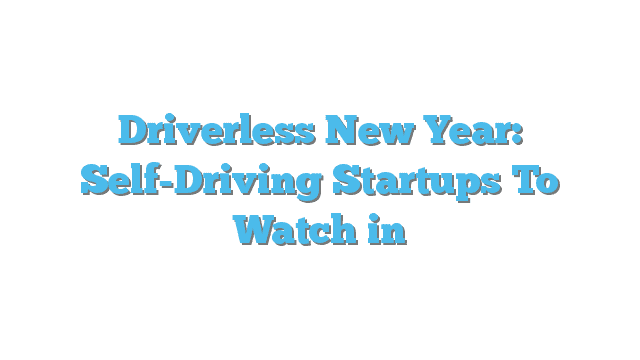2016 was the year of many things. For the auto and tech industries, it was the year the companies that already placed their bets on self-driving technology began showing their hands.
Auto giants — some of which were increasingly aware that they were moving into relatively uncharted territory – began buying up or otherwise forging partnerships with tech startups. GM acquired Cruise and partnered with Lyft. Ford acquired Chariot and Israeli machine learning and computer vision startup SAIPS.
As the hype around driverless cars grew, so did the demand for teams with backgrounds in AI and machine learning — both relatively nascent fields. Even the biggest tech companies, namely Uber, were left wanting.
So, Uber also went on somewhat of a purchasing tear and acquired then six-month-old self-driving trucking startup Otto and put Anthony Levandowski, its co-founder and one of the founders of Google’s self-driving project, at the head of all of Uber’s autonomous efforts. The ride-hail company then bought out AI startup Geometric Intelligence and tapped its co-founder Gary Marcus to head up Uber’s new AI lab.
Investors took notice and also began placing their bets — if they hadn’t already.
Around the same time as the Cruise acquisition — which was seen as a coup for Silicon Valley — A16z invested in aftermarket autonomous startup Comma.ai. Shortly after, Andy Rubin’s Playground invested in aftermarket car tech startup Nauto. The list goes on.
This demand will likely continue as companies trudge forward in the competition to build and develop self-driving cars. That means investors will be paying attention to startups with the skills to build any aspect of the self-driving stack as some of them increasingly become potential acquisition targets while the others take on the biggest names in transportation.
In no particular order, here is a non-exhaustive list of the startups we’ll be watching:
Chris Urmson’s Self-Driving Startup
Call it premature, but investors will be keeping a close eye on what the former chief technology officer of Google’s self-driving project will be doing. Urmson, who left Google in August, is starting his own autonomous startup, sources told Recode.
We don’t know much about the company except that Urmson likely plans on developing the full stack of autonomous hardware and software and then licensing it to automakers.
So how do we know it’s worth watching? Well, for investors, the company looks like a win-win. Urmson — a much sought-after engineering talent himself — has already approached big names from companies like Uber, Tesla and Apple.
So at the very least, the yet-to-be-named or -launched company is certainly an acquisition target purely for the talent, if nothing else. But at most, not only does Urmson have the technical know-how, he seems to have a path to market in mind, according to sources. So it could prove to be a worthy investment even as an independent company.
Zoox
Zoox, which recently closed a $200 million round at a $1 billion valuation, is building a fully electric fleet of self-driving vehicles to be used in a ride-hail service. The company has yet to unveil its vehicle or much of its plans but is one of the few startups attempting to build a car from the ground up.
That’s a hard problem that even Waymo — Alphabet’s self-driving subsidiary — and Apple have reportedly decided against pursuing. That’s exactly why several sources say the company had difficulty raising its most recent round.
But it’s also what makes the company intriguing. However unlikely or difficult it may seem, if Zoox is able to build everything from the vehicle to the self-driving software to the ride-hail platform, it will be the only company to do so without partnering with other players. In 2017, fresh off a new infusion of cash, it’s likely the company will have to officially show off some part of its full fledged robot-taxi service.
Drive.ai
Drive.ai recently launched out of stealth with one pitch: The solution to all your self-driving uncertainties is deep learning — a type of machine learning. The company’s co-founder Sameep Tandon insists the startup is the only company using deep learning to power the entire autonomous system.
That means it’s powering everything from the sensors and cameras, to the vehicle’s decision-making, to the way the car communicates with people and things around it.
The company, which has raised $12 million to date, also launched having already secured a few commercial fleet partnerships for which the company will retrofit their software and hardware stack into vehicles in order to collect, test and verify real-world driving data. Not to mention, its founders – who wouldn’t give too many more details about the partnerships – claim to be among the few people with extensive backgrounds in deep learning.
Nuro.ai
Though it was co-founded by Jiajun Zhu and Dave Ferguson – two of the top self-driving engineers from Google’s car shop – the robotics and AI startup Nuro.ai won’t focus only on transportation.
While the first in its suite of products will be a fully self-driving car — which the company hopes to launch in the next two to four years — Nuro also plans to draw from the wide range of machine learning and robotics experience its staffers have to build a series of AI-powered products.
The company, still in semi-stealth mode, has raised some money – though its head of product Michael Hanuschik wouldn’t disclose how much. But again, purely based on talent, the company may be worth the attention.
Nuro’s team includes engineers with robotics, artificial intelligence and self-driving experience who had a hand in either developing or shipping an unusually wide range of products including Nexus cameras, Google Image search, the Mars Exploration and Curiosity Rovers, Google street view, Google’s self-driving cars and a number of surgical tools.
nuTonomy
This MIT spinoff, which has headquarters in Singapore and Massachusetts, has made significant strides that rival its more established competitor, Uber. In a matter of months, the company beat out Uber and other players and was named Singapore’s official autonomous research and development partner, it partnered with Uber’s Southeast Asian rival Grab and launched a self-driving pilot [seen here] in both Singapore and Massachusetts.
To date, the three-year-old company has raised just under $20 million. NuTonomy is also testing its vehicles in Michigan and in the U.K., where the company said it has a partnership with Jaguar Land Rover.
Varden Labs
Varden Labs is a stealth self-driving company that graduated from startup incubator Y Combinator as part of the Winter 2016 class. The company recently raised $4.5 million in seed funding which was led by Maven Ventures. Notably, both Maven and Y Combinator were investors in Cruise.
There’s very little known about the startup, but the site and past coverage of the company focus on developing autonomous technology on the cheap. The co-founders of the company, Michael Skupien and Alex Rodrigues, previously retrofitted golf carts to drive autonomously around the University of Waterloo in 2015 and other college campuses.
“We constructed a self-driving vehicle for public roads faster and cheaper than anyone in history. In an industry filled with billion dollar titans we are fast, lean and creative,” the site reads.
The company expects to launch officially in February and should disclose more details on its plans then.
More Auto-Tech Startups To Watch
These other companies wouldn’t qualify as self-driving startups in their current iterations but have ambitions to lend some or all of their capabilities to power autonomous tech: Pearl Auto, Nauto, Driversiti, Quanergy, and Zendrive.







